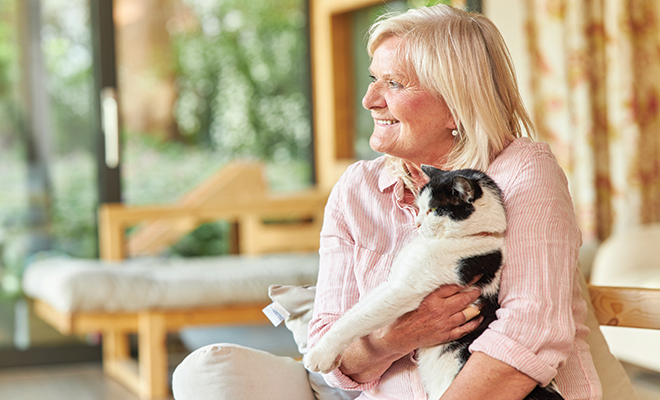
Pets: A Pawsitive Effect on Seniors
As we age, we’re faced with a significant number of changes and uncertainties. Loneliness can also become a new companion, one we never expected and certainly never planned to welcome. Loved ones and friends may move away or pass away; leaving the house can become increasingly challenging. A lack of comfort and companionship creates a void in our lives. Fortunately, there is an antidote: pets.
I t’s no secret animals can help reduce stress, increase social interaction and even lower blood pressure. Plus, pets such as dogs and cats can teach us an invaluable lesson: living in the moment. They don’t spend time worrying about the past or growing anxious about the future, which can be a highly sensitive subject for an older person. Animals live for the here and now, and that contagious attitude tends to positively affect humans.
Pets offer a much-needed sense of companionship, assuaging that sense of loneliness and isolation. Having a constant, loving and attentive companion in the home can have a remarkable transforming effect on depression and sadness. Additionally, animals can promote increased memory recall in older owners. When a senior has a pet and the related responsibilities of caring for the pet, there is less time to focus on physical conditions they might have or on any negative thought processes they might dwell upon about aging and loss.
Before hopping in the car and heading to your local animal shelter to find a new pet to love, whether for yourself or a loved one, be aware there are certain questions to answer first. If the senior for whom you are considering getting a pet is not very adaptive to change, introducing a pet can be a source of frustration. Has this person cared for a pet before? Experienced owners tend to fare better with bringing a new pet into their lives than those who have never cared for one. However, enthusiastic first-timers who are open to this new and rewarding experience may do quite well.
Consider, too, if the senior has any disabilities or functional limitations. Dogs are great companions who can encourage older adults to exercise, but for those who cannot move about with ease, a lower-maintenance pet, such as a bird or a cat, might be a better idea. Further, a puppy or kitten may not be the ideal age for a pet for a senior, as animals this young require a considerable amount of training and care. Pets that are potty-trained and settled are typically a better companion for the elderly. It is equally important to evaluate the finances involved in caring for a pet. A low maintenance pet, such as a fish, is much more affordable than taking care of a dog’s needs throughout the year. Therefore, it’s essential to determine one’s budget when choosing the perfect pet companion.
For older adults who reside in senior communities, there may be a pet coordinator on site who can assist owners to ensure their pets are receiving the proper food, medication, activity and love they need. These communities may also offer pet therapy programs in which gentle animals meet with residents on a regular basis to provide the healing benefits for which they are known. Some communities even offer dog grooming and dog walking services, while other communities may only allow small dogs, cats, fish or rabbits. Be sure to inquire of the community about its pet policy.
Different pets have different qualities that require a varying range of responsibilities, resources and energy. Most seniors desiring a pet are typically looking for one that allows them to maintain their current standard of living, doesn’t need a lot of space and doesn’t require much cleaning or exercise. Fortunately, there is a wide range of pets available to seniors that can meet them where they are physically, emotionally and mentally. Dogs are great for those who like to get up and move around while cats are the perfect companion for seniors who may not have the strength or energy to take a dog on a walk.
Yes, it’s important to consider the downsides of pet ownership for seniors, but it’s also important to note the aforementioned health benefits of animals for seniors. Caring for a pet does provide an older adult with a sense of purpose and also encourages physical activity while simultaneously reducing stress, lowering blood pressure and reducing anxiety and pain, among other wonderful benefits. You simply have to weigh the pros and cons of the decision to determine if a new furry friend is the right decision for you or the older adult in your life. If you’re interested in finding an adoptable pet in your area, contact your local animal shelter or access online the American Society for the Prevention of Cruelty to Animals national database. ■
Sources: agingcare.com and aplaceformom.com.







